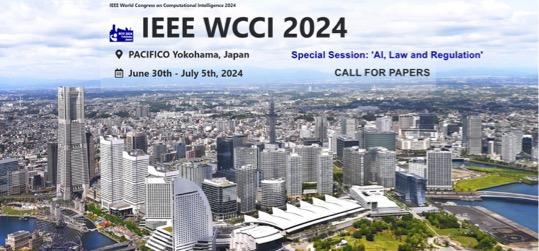Special Session: ‘AI, Law and Regulation’
Breakthrough discoveries in Artificial Intelligence applications began to permeate the lives of ordinary people, challenging the economy, education, and creative industries. While seeking to support innovative solutions and facilitate investment, influential global powerhouses began adopting regulations to safeguard the interests, and fundamental rights and freedoms of their citizens. Hence, the regulatory challenges, issues, and landscape across the AI value chain of design, development, and deployment are at the forefront of legal debate. It is critical to highlight the foreseeable legislative changes and impact on AI pioneers by bridging the interdisciplinary gap between AI developers and socio-legal aspects of AI Applications. Chiefly, whether we are looking at discriminative or generative models – it is necessary to present a comparative view of the existing rules, issues, and compliance obligations against the technical possibilities and limitations of system architectures. This special session seeks to connect critical legal perspectives on the governance frameworks for AI: regulatory considerations, industry standards, best practices, and how AI undermines current legal assumptions and how these will be addressed. The session seeks contributions that will reduce gaps between system architecture design, input and output, and their legal ramifications.
This session is designed to serve the WCCI community with an inevitable discussion on the governance and implementation of global regulatory standards (AI Act, GDPR and beyond) to incentivise responsible innovation and prevent technical debt, as demanded and shaped by the law. Main topics of this special session include the regulatory landscape and issues associated with the model architecture, inputs and outputs.
1. System Input: aspects of Intellectual Property (Copyright Protection etc.), Data Protection and Privacy, Ethics and Transparency requirements for Generative and Predictive models etc.
Associated with: (a) data mining, harvesting, web scrapping; (b) compliance in user profiling, big data management, data aggregation; (c) transparency of input; (d) safeguarding intellectual property, authorship, inventorship, ownership, infringement (e) information security and privacy protection, purpose limitation, data minimisation (f) human rights, consent.
2. Model Architecture: aspects of eXplainability, transparency, interpretability of decision-making processes, requirements of risk-based management systems, technical standards, model safety (cyber security) and accountability (liability, negligence etc.), practices and obligations.
Associated with: (a) eXplainability for high-risk applications; (b) trustworthiness in decision-making; (c) model transparency requirements; (d) data protection by design and default; (e) privacy engineering; (f) risk management and assessment; (g) regulating algorithmic bias and discrimination and (h) prohibited AI practices.
3. System Output: aspects of regulating the disruption arising from AI applications, placement of liability, impact on various industries including finance, healthcare, education, media, advertisement etc.
Associated with: (a) labelling Generative AI content, watermarking, hashing, communication; (b) accountability measures for output (illegal content, deepfakes etc.); (c) content manipulation; (d) governance of decision making and data processing in critical infrastructures, recruitment, law enforcement, credit scoring.
Short Summary:
This special session seeks to connect critical legal perspectives on the governance frameworks for AI: regulatory considerations, industry standards, best practices, and how AI undermines current legal assumptions and how these will be addressed. The session seeks contributions which will reduce gaps between system architecture design, input and output and their legal ramifications.
SPECIAL SESSION: ‘AI, Law and Regulation’
Greetings from the WCCI 2024 Special Session Organisers,
IEEE World Congress on Computational Intelligence (WCCI) 2024 is the world’s largest technical event on computational intelligence, featuring the three flagship conferences of the IEEE Computational Intelligence Society (CIS) under one roof. WCCI 2024 will be held in Yokohama, Japan. Yokohama is a city that inspires academic fusion and multidisciplinary & industrial association.
We are inviting you to our CALL FOR PAPERSfor our Special Session on ‘AI, Law and Regulation’, designed to serve the WCCI community with an inevitable, collaborative discussion on the governance and implementation of global regulatory standards (AI Act, GDPR and beyond)to incentivise responsible innovation and prevent technical and ethical debt, as demanded and shaped by the law.
This special session seeks to connect critical legal perspectives on the governance frameworks for AI: regulatory considerations, industry standards, best practices, and how AI undermines current legal assumptions and how these will be addressed. The session seeks contributions which will reduce gaps between system architecture design, input and output and their legal ramifications.
Main topics of this special session include the regulatory landscape and issues associated with the model architecture, inputs and outputs.
- System Input: aspects of Intellectual Property (Copyright Protection etc.), Data Protection and Privacy, Ethics and Transparency requirements for Generative and Predictive models etc.
- Model Architecture: aspects of eXplainability, transparency, interpretability of decision-making processes, requriements of risk-based management systems, technical standards, model safety (cyber security) and accountability (liability, negligence etc.), practices and obligations.
- System Output: aspects of regulating the disruption arising from AI applications, placement of liability, impact on various industries including finance, healthcare, education, media, advertisement etc.
For full details on the Special Session visit https://2024.ieeewcci.org/special-sessions
Author guidelines can be found here https://2024.ieeewcci.org/submission
KEY DATES
- Paper Submission Deadline: 15 January 2024
- Paper Acceptance and Notification: 15 March 2024
- Final Paper Submission & Early Registration Deadline: 1 May 2024
- IEEE WCCI 2024 Yokohama, Japan: 30 June to 5 July 2024
Kind Regards,
Special Session Organisers
Chair: Amanda Horzyk, Researcher in Innovation, Technology Law, University of Edinburgh,www.linkedin.com/in/amanda-horzyk-73819016a
Corresponding Chair’s E-mail: amandahorzyk@outlook.com
Co-Chairs:
Nicola Fabiano, Lawyer at Studio Legale Fabiano, Adjunct Professor, Ostrava University (Rome) www.fabiano.law
Asim Roy Professor of Information Systems, Arizona State University, search.asu.edu/profile/9973
Other Special Session Organisers
Vagelis Papakonstantinou, Professor of Law, Vrije Universiteit Brussel, vpapakonstantinou.com
Lachlan D. Urquhart, Dr. Senior Lecturer in Technology Law and Human-Computer Interaction, University of Edinburg, www.lachlansresearch.com
Giovanni De Gregorio, Law Professor, Católica Global School of Law, catolicalaw.fd.lisboa.ucp.pt/person/giovanni-de-gregorio
Monica Palmirani, Full Professor in Legal Infromatics, School of Law, University of Bologna, www.unibo.it/sitoweb/monica.palmirani/en
Mikolaj Barczentewicz, Associate Professor, University of Surrey School of Law, www.barczentewicz.com
Martin Ebers, president of Robotics & AI Law Society (RAILS), Associate Professor of IT Law at the University of Tartu, ai-laws.org/dt_team/ebers/?lang=en
Burkhard Schafer, Professor of computational legal theory at University of Edinburgh, https://www.law.ed.ac.uk/people/professor-burkhard-schafer

- Logige sisse kommentaaride postitamiseks

